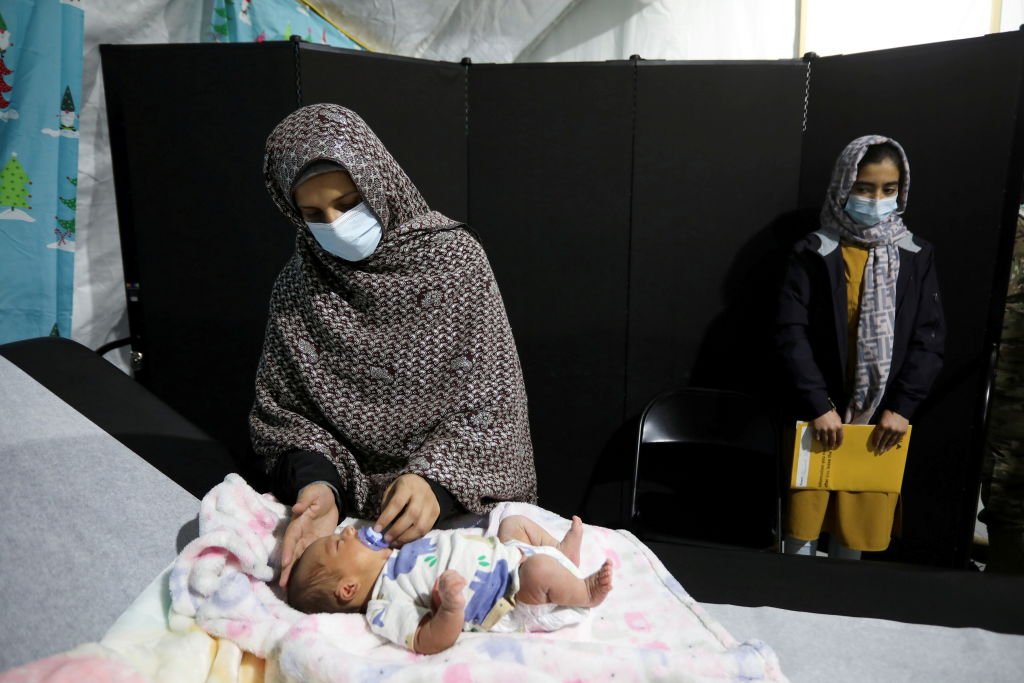In 2021, Afghan refugees were seen caring for their toddlers in a pediatric ward at a medical facility in McGuire Dix Lakehurst, New Jersey.
About 1.4 million immigrants legally residing in the United States—yet not citizens—are facing challenges in accessing government-subsidized healthcare. This follows the signing of a substantial tax and spending bill by former President Donald Trump this summer, as noted by a nonpartisan assessment from the Congressional Budget Office.
The newly enacted One Big Beautiful Bill Act cuts federal spending on Medicaid, which is aimed at assisting low-income individuals. The law adds stricter eligibility requirements for legally present immigrants, including refugees, who benefit from government health programs such as Medicaid, CHIP, Medicare, and the ACA Marketplace.
For a long time, many undocumented immigrants have been unable to access federally funded health insurance.
However, some states, including California, Colorado, Illinois, Minnesota, New York, Oregon, and Washington, are providing state-funded healthcare for non-citizen adults regardless of immigration status. Additionally, 14 states and the District of Columbia offer state-funded coverage to all children, irrespective of their legal standing.
The recent restrictions introduced by the One Big Beautiful Bill, along with other policies from the Trump administration, have left states with fewer federal funds. This makes it challenging for them to maintain programs that support all immigrants, regardless of their legal status.
“We’re moving away from essential public health measures by excluding more people and cutting federal resources from states that need them,” commented Tanya Broder, a senior advisor at the National Immigration Law Center.
“Consequently, the health of our families and communities is at risk, and we’re undermining the very healthcare infrastructure that serves us all,” Broder added.
Some states that previously offered health insurance to all immigrants are now scaling back these initiatives.
California’s Democratic Governor Gavin Newsom recently signed a budget plan that restricts immigration-related healthcare, particularly for non-citizen adults. Starting in 2027, current enrollees aged 19 to 59 in the state’s Medicaid will have to pay a new premium. Additionally, by mid-2026, the state will stop offering dental care to non-citizens.
Illinois has halted its federally funded health program for immigrants aged 42 to 64, while maintaining funds for residents over 65. Minnesota is also planning to exclude undocumented adult immigrants from compensation programs that were previously available.
New York finds itself in a unique situation because its constitution prohibits discrimination against legally present immigrants in terms of public service access.
According to Jessica Vaughn, director of policy studies at the Center for Immigration Studies, these policy changes reflect a desire to discourage people from remaining in the country illegally. “These changes create a compelling reason for individuals to leave rather than to stay,” Vaughn explained.
Non-citizens losing access to federally funded benefits are likely to seek state-funded health coverage, as noted by Drishti Pillai, director of immigration health policy at KFF. “This wave of demand comes at a time when states are grappling with budget issues, particularly due to Medicaid cuts,” Pillai added.
Meda Mahlf from Dickinson Law remarked that the Trump administration’s approach appears to be a broader strategy targeting marginalized communities to limit their public support. “Those invested in healthcare access need to pay attention to what’s happening with immigrants,” she stated. “When we normalize denying care based on someone’s status, it creates a precedent that could affect any group.”
California anticipates losing around $28.4 billion in federal Medicaid funding under the new law. During a recent Senate session, Democratic Senator Maria Elena Durazo expressed deep disappointment over the state’s decision to limit support for immigrants. “The joy we had when expanding healthcare has shifted to pain and shame,” she lamented.
Yet, Senator Mike McGuire cautioned that tough decisions were necessary given the state’s demographic makeup. “With 10.6 million immigrants, we cannot disregard those who contribute to our economy,” he said. “We know we’re making difficult choices, but pleasing everyone isn’t feasible.”
New York’s situation is complicated by its constitutional obligation to provide for legally present non-citizens. One individual, 27-year-old Roxana, who has chronic health issues, relies on state-funded public health compensation after being diagnosed with a hormonal condition. Although she can currently access healthcare, she’s fearful of any potential cuts or changes that could jeopardize her ongoing treatment.
Roxana expressed concern, “My condition has worsened over the years. I really need access to healthcare to manage it effectively.”







